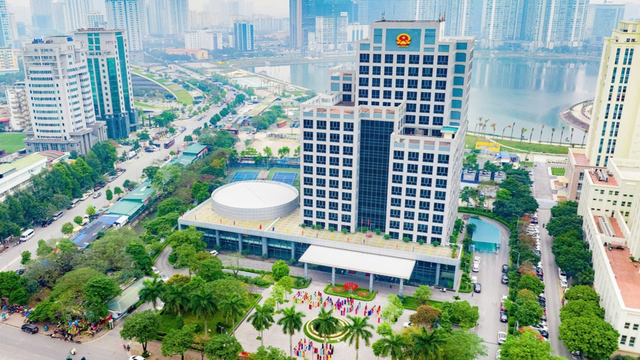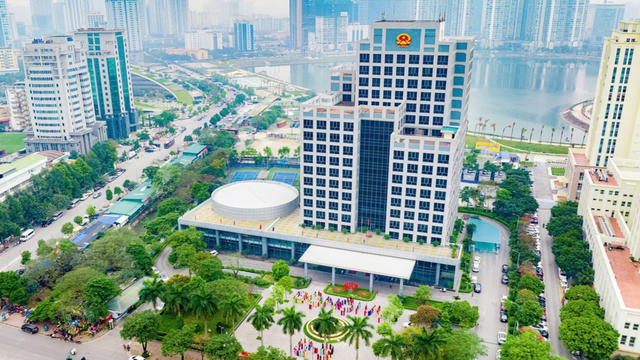
The Government Portal announces that, according to the Draft Decree replacing Decree No. 29/2023/ND-CP dated June 3, 2023, on the regulation of streamlining personnel, which was sent to the Ministry of Justice for appraisal, the Draft Decree is built on the basis of inheriting Decree No. 29/2023/ND-CP with some modifications and supplements to the following contents:
On the subjects of implementing the policy of streamlining personnel (Article 2)
Inheriting the suitable regulations in Decree No. 29/2023/ND-CP, the Draft Decree proposes: Remove the subject “Redundant due to rearrangement of district- and commune-level administrative units according to the decision of the competent authority” (Point b, Clause 1, Article 2 of Decree No. 29/2023/ND-CP), because the policy for cadres, civil servants, officials, and civil servants at the commune level who are redundant due to the rearrangement of administrative units has been stipulated in Decree No. 178/2024/ND-CP (amended and supplemented in Decree No. 67/2025/ND-CP).
Replace the subject “Having 02 consecutive years before the time of considering the streamlining of personnel, cadres, civil servants, and officials have 01 year of quality assessment at the level of completing the task and 01 year of not completing the task but unable to arrange other suitable jobs” (Point d, Clause 1, Article 2 of Decree No. 29/2023/ND-CP) with “In the year immediately preceding or in the year of implementing the consideration of streamlining personnel, the quality assessment is at the level of not completing the task” to ensure conformity with the provisions of the draft Law on Cadres and Civil Servants in 2024, which will be soon promulgated (resolving dismissal for civil servants who have 01 year of not completing the task)
Replace the subject “Having 02 consecutive years before the time of considering the streamlining of personnel, the total number of days off work due to illness is equal to or higher than the maximum number of days off due to illness as prescribed in Clause 1, Article 26 of the Law on Social Insurance; certified by the social insurance agency paying sick leave according to the current regulations of law” (Point e, Clause 1, Article 2 of Decree No. 29/2023/ND-CP) with “In the year immediately preceding or in the year of implementing the consideration of streamlining personnel, the total number of days off work due to illness is equal to or higher than 300 days; certified by the social insurance agency paying sick leave according to the current regulations of law” to be in line with the reality that within 01 year, the number of days off due to illness is high (more than 300 days), then they belong to the subject of streamlining personnel.
Replace the phrase “Cadres, civil servants, and officials who are leaders and managers who are no longer in office due to the rearrangement of the apparatus, administrative units by the decision of the competent authority, individuals who voluntarily implement the streamlining of personnel, and are agreed upon by the direct managing agency” (Point g, Clause 1, Article 2 of Decree No. 29/2023/ND-CP) with “Cadres, civil servants, and officials who are leaders and managers who are no longer in office due to the rearrangement of the apparatus or restructuring, improving the quality of the team of leaders and managers by the decision of the competent authority or by the decision of the competent authority to dismiss from the leadership position, individuals who voluntarily implement the streamlining of personnel and are agreed upon by the direct managing agency” (remove the phrase “administrative units” to suit the scope of the Decree; at the same time, supplement other cases of dismissal from the leadership position to suit the reality)
Remove the subject “Cadres, civil servants, and officials who are currently under disciplinary action but have not yet reached the level of being dismissed or forced to resign according to the provisions of law at the time of considering the streamlining of personnel, individuals who voluntarily implement the streamlining of personnel, and are agreed upon by the direct managing agency” (Point h, Clause 1, Article 2 of Decree No. 29/2023/ND-CP), because according to the provisions of law, those who are disciplined are assessed as not completing the task, so these subjects belong to the above-mentioned subjects of streamlining personnel.
For those who are non-specialized staff at the commune level, in the village or residential group (Clause 3, Article 2 of Decree No. 29/2023/ND-CP): Replace the phrase “take a break within 12 months” with “take a break immediately” to be in line with the direction of “stopping the use of non-specialized staff at the grassroots level (commune, ward, township)” according to Conclusion No. 126-KL/TW.
On amending and supplementing the principles of streamlining personnel (Article 3)
Inheriting the suitable regulations in Decree No. 29/2023/ND-CP, the Draft Decree proposes to supplement the following principle: “If the subjects of streamlining personnel meet the conditions to enjoy the policy of streamlining personnel stipulated in different documents, only the highest policy will be applied” so that civil servants and officials who are subjects of applying the policy of this Decree and Decree No. 178/2024/ND-CP (amended and supplemented in Decree No. 67/2025/ND-CP) will be applied with only the highest policy.
On how to determine the salary for calculating the streamlining allowance
The method of determining the average monthly salary for calculating the streamlining allowance levels stipulated in Decree No. 29/2023/ND-CP is based on inheriting the Government’s regulations (Decree No. 132/2007/ND-CP dated August 08, 2007, Decree No. 108/2014/ND-CP dated November 20, 2014; Decree No. 113/2018/ND-CP dated August 31, 2018, Decree No. 143/2020/ND-CP dated December 10, 2020) which have been implemented for nearly 20 years.
Accordingly, when building Decree No. 178/2024/ND-CP, the Ministry of Home Affairs proposed that the monthly salary for calculating policies and regimes is the monthly salary immediately before the cadres, civil servants, and officials retire.
Therefore, to ensure the correlation between the streamlining policies in this Decree and Decree No. 178/2024/ND-CP (amended and supplemented in Decree No. 67/2025/ND-CP), the Draft Decree proposes that the monthly salary for calculating the streamlining allowance for cadres, civil servants, and officials is the current monthly salary.
On that basis, it is proposed to regulate the method of calculating the average monthly salary and replace the phrase “average salary” with “current salary” throughout the Draft Decree.
On regimes and policies
Amending and supplementing the policy of early retirement (Article 6)
To suit the provisions of the 2024 Social Insurance Law (taking effect from July 01, 2025) and the correlation with the policy of early retirement for subjects of streamlining personnel stipulated in Decree No. 67/2025/ND-CP, the Draft Decree has amended and supplemented the following contents:
Regulate the allowance level according to the number of years of early retirement: “05 months of current monthly salary for each year of early retirement”
For the allowance level according to the number of years of social insurance: To suit the provisions of the 2024 Law on Social Insurance, the Draft proposes to supplement the method of calculating the allowance for those who have from 15 years to under 20 years of work with compulsory social insurance, with an allowance of 05 months of current monthly salary. Accordingly, remove the regulations on the method of calculating the allowance for female cadres and civil servants at the commune level with from 15 years to under 20 years of work with compulsory social insurance.
Amending and supplementing the policy of immediate dismissal (Article 7)
The streamlining policy in Decree No. 108/2014/ND-CP dated November 20, 2014; Decree No. 113/2018/ND-CP dated August 31, 2018, Decree No. 143/2020/ND-CP dated December 10, 2020 has stipulated the policy of immediate dismissal for those who are from 02 years old or older until retirement age and do not meet the conditions for early retirement.
Accordingly, those who are from 02 years old or younger until retirement age and have not yet had enough time to contribute to compulsory social insurance to retire are not subjects of enjoying the immediate dismissal policy.
However, in the implementation process, the Ministry of Home Affairs has received some opinions from ministries, branches, and localities proposing to supplement the policy for these subjects.
Therefore, to ensure their benefits, the Ministry of Home Affairs proposes to supplement the subjects of streamlining personnel who are from 02 years old or younger until retirement age and have not yet had enough time to contribute to compulsory social insurance to retire, to enjoy the policy of immediate dismissal.
Remove Article 8, which stipulates the “Policy of early retirement for cadres and civil servants at the commune level who are redundant due to the rearrangement of commune-level administrative units with an age lower than the maximum of 10 years and lower than the minimum of 05 years compared to the retirement age prescribed by law on social insurance” and Clause 1, Article 9, which stipulates the “Policy for cadres, civil servants, and officials at the district and commune levels who are redundant due to rearrangement of administrative units”, because the policies for these subjects have been stipulated in Decree No. 178/2024/ND-CP (amended and supplemented in Decree No. 67/2025/ND-CP)
On the policy for non-specialized staff at the commune level, in the village or residential group who are redundant due to the rearrangement of commune-level administrative units to take a break immediately from the time the competent authority has a decision on rearrangement.
To suit the direction of ending the use of non-specialized staff at the commune level when implementing the model of local government with 02 levels, the Ministry of Home Affairs proposes to design policies for non-specialized staff at the commune level, in the village or residential group into 02 Articles: Article 9 (stipulating the policy for non-specialized staff at the commune level to take a break immediately when implementing the model of local government with 02 levels according to the Law on Organization of Local Government) and Article 10 (stipulating the policy for non-specialized staff in the village or residential group to take a break immediately from the time the competent authority has a decision on rearrangement). The specific content is as follows:
First, for non-specialized staff at the commune level to take a break immediately when implementing the model of local government with 02 levels according to the Law on Organization of Local Government.
On the basis of inheriting the policy design stipulated in Decree No. 29/2023/ND-CP and Decree No. 178/2024/ND-CP, the Ministry of Home Affairs proposes to design the policy for non-specialized staff at the commune level to take a break immediately due to the direction of ending the use of non-specialized staff at the commune level, calculated according to their working process (similar to the policy design of immediate dismissal for cadres and civil servants at the commune level stipulated in Decree No. 178/2024/ND-CP), specifically as follows:
For those who have not yet reached retirement age as prescribed, they shall be entitled to the following regimes at the same time:
One, entitled to an allowance for taking a break immediately
When implementing the model of local government with 02 levels, the use of non-specialized staff at the commune level will be stopped.
Accordingly, to ensure the correlation in the policy for non-specialized staff at the commune level to take a break immediately, the Draft Decree has stipulated that the one-time allowance for taking a break immediately shall be calculated on the basis of the remaining time compared to the retirement age for those who have had working time with compulsory social insurance contribution of from 05 years or more, and for those with less than 05 years of working time with compulsory social insurance contribution, the allowance for taking a break immediately shall be calculated on the basis of the number of years of social insurance contribution (similar to the policy design of early retirement stipulated in Decree No. 178/2024/ND-CP), specifically as follows:
For those with less than 05 years of working time with compulsory social insurance contribution, they shall be entitled to a one-time allowance equal to 0.8 times the current monthly allowance multiplied by the number of months of social insurance contribution.
For those with from 05 years of working time with compulsory social insurance contribution or more and less than 05 years left until retirement age, they shall be entitled to a one-time allowance equal to 0.8 times the current monthly allowance multiplied by the number of months of early retirement.
For those with from 05 years of working time with compulsory social insurance contribution or more and from 05 years or more left until retirement age, they shall be entitled to a one-time allowance equal to 0.8 times the current monthly allowance multiplied by 60 months.
Two, entitled to an allowance of 1.5 times the current monthly allowance for each year of work with compulsory social insurance contribution.
Three, entitled to an allowance of 03 months of current monthly allowance to find a new job.
Four, entitled to preserve the time of compulsory social insurance contribution or enjoy social insurance benefits once according to the provisions of law on social insurance.
For cadres and civil servants at the commune level who were arranged to work as non-specialized staff at the commune level due to the rearrangement of commune-level administrative units in the 2023-2025 period, they shall be entitled to the regimes stipulated in Clause 1 of this Article, but the current monthly salary for calculating the allowance is the monthly salary immediately before the position of cadres and civil servants at the commune level, before being arranged to work as non-specialized staff at the commune level.
For non-specialized staff at the commune level, in the village or residential group who have reached retirement age or are enjoying retirement or loss of working capacity benefits: This is a new policy compared to the regulations in Decree No. 29/2023/ND-CP.
This policy is designed similarly to the policy for those who are over retirement age but continue to work and must take a break immediately as stipulated in Decree No. 178/2024/ND-CP.
Specifically: Decree No. 178/2024/ND-CP stipulates that those who are over retirement age but are allowed by the Politburo and the Secretariat to continue working, when taking a break immediately, shall be entitled to a one-time allowance equal to 30 months of current monthly salary.
Accordingly, the Ministry of Home Affairs proposes that for non-specialized staff at the commune level, in the village or residential group who have reached retirement age or are enjoying retirement or loss of working capacity benefits, when taking a break immediately, they shall be entitled to an allowance equal to 15 months of current monthly allowance (equal to 1/2 of the allowance level stipulated in Decree No. 178/2024/ND-CP)
Second, for non-specialized staff in the village or residential group to take a break immediately from the time the competent authority has a decision on rearrangement.
For those who have not yet reached retirement age, they shall be entitled to the same regimes as the regimes for non-specialized staff at the commune level to take a break immediately when implementing the model of local government with 02 levels according to the Law on Organization of Local Government mentioned above.
However, since non-specialized staff in the village or residential group are not subject to compulsory social insurance contribution, the working time to calculate the allowance for these cases shall include: (i) working time with compulsory social insurance contribution; (ii) working time in the position of non-specialized staff in the village or residential group (without compulsory social insurance contribution)
For non-specialized staff in the village or residential group who have reached retirement age or are enjoying retirement
Optimizing Government Support: Streamlining Benefits for Redundant Non-Specialist Workers in Rural and Urban Communities
The Ministry of Home Affairs has proposed that non-professional workers in villages and residential areas who are laid off due to restructuring but are still of working age will be entitled to four support schemes upon their departure.
Proposed Drastic Increase in Fines for Counterfeit Goods Production and Trading: A Maximum Penalty of VND 400 Million
The Ministry of Industry and Trade has proposed a significant increase in fines for the production and trading of counterfeit and prohibited goods.





















